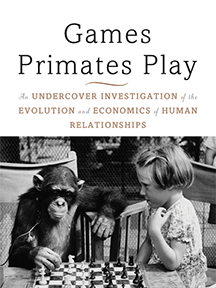By Douglas Candland
The book under review lies within the untitled genre of works that use evolution, lightly conceived, to compare animal behaviors to human behaviors, tacitly suggesting an evolutional lineage. The idea is that human behavior offers homologies with animal behavior, presumably through the push of natural selection. The addition of personal stories graces (or detracts, depending upon one’s fancy) the work under review. The autobiographical material offers to the reader the addition of information about the author’s career and, not incidentally, provides the reader with clues as to what drives the putative scientist to ask one research question rather than another.
Dario Maestripieri, whose previous book Macachiavellian (sic) Intelligence, modifies Machiavellian Intelligence, a book edited by others, to describe how a member of the genus Macaque, the rhesus monkey, uses deceit as a means of furthering their social and reproductive interests. The term ‘Machiavellian Intelligence’ has currency, as the study of animal behavior, especially that of the nonhuman primate, has moved away from the techniques of behaviorism, which consider explanations in terms of internal motivation to be anthropomorphic, toward accounts, such as this book, that face the risk of saying too little about how science is done and too much about possible cross-species comparisons.
The author walks us through a comparison of animal behavior, most frequently the behavior of rhesus monkeys and, at times, baboons, great apes, hyenas, and a bird here and there, in both laboratory and field settings. Animal-like human behavior is described in the work-place, family relationships, studies of when human beings cooperate and when they do not, his experience with senior colleagues and federal granting agencies, his adventures with publishers, trust, mate-choice (his and others), nepotism, the handicap principle, how love and commitment are tested, and the relationship of the later to mate-selection, here called mate-shopping.
This book, which promises a discussion of the evolution of human relations, is long on personal narrative and short on the complexities of evolution and comparative psychology, at least until the last chapter. The subtitle, promising an ‘undercover’ look at evolution and human behavior, is baffling.
The tone is accessible with engaging asides and stories of the author’s life and relationships. References are included as footnotes, but this reviewer often wished that the more arguable conclusions and statements were also supported by references. How the opinions and stories relate to the announced topic of the book is not always made evident. The last chapter on the evolution of human social behavior could make a splendid beginning to a book, as it is at once clear and reasoned.
The charming cover, featuring a photograph of a young girl engaged in a game of chess with a chimpanzee, may be a metaphorical parable. From the position of the chess pieces, it appears that both are arming the center-board for the destructive end-game after the chimpanzee has foiled the girl’s attempt at fool’s mate. After reading the book, it is difficult to decide whom to cheer on.
Douglas Candland (ΦBK, Pomona College, 1956) is the editor of Review of General Psychology and the Homer P.Rainey Professor of Psychology and Animal Behavior, Emeritus at Bucknell University. Bucknell University is home to the Mu of Pennsylvania chapter of Phi Beta Kappa.




